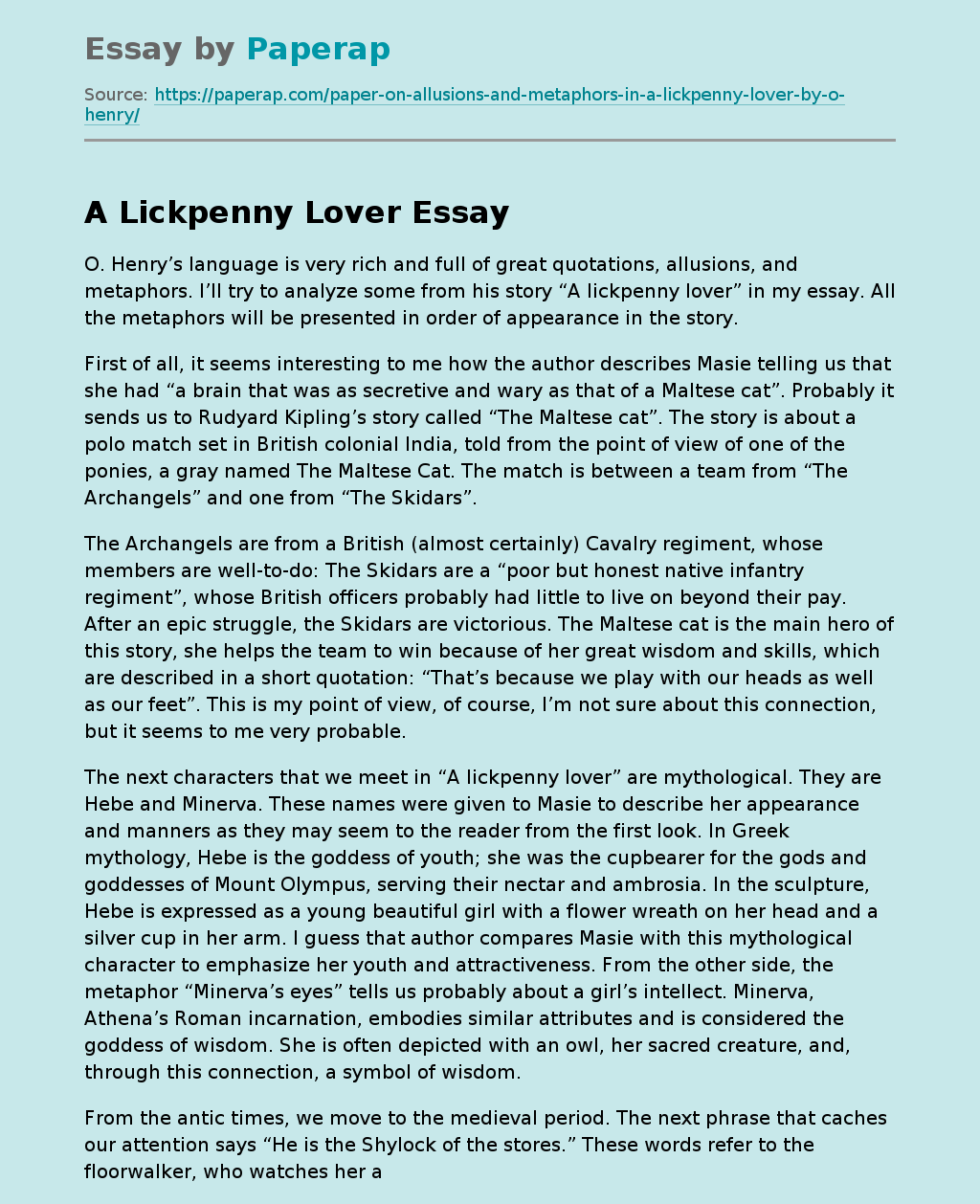A Lickpenny Lover
O. Henry’s language is very rich and full of great quotations, allusions, and metaphors. I’ll try to analyze some from his story “A lickpenny lover” in my essay. All the metaphors will be presented in order of appearance in the story.
First of all, it seems interesting to me how the author describes Masie telling us that she had “a brain that was as secretive and wary as that of a Maltese cat”. Probably it sends us to Rudyard Kipling’s story called “The Maltese cat”.
The story is about a polo match set in British colonial India, told from the point of view of one of the ponies, a gray named The Maltese Cat. The match is between a team from “The Archangels” and one from “The Skidars”.
The Archangels are from a British (almost certainly) Cavalry regiment, whose members are well-to-do: The Skidars are a “poor but honest native infantry regiment”, whose British officers probably had little to live on beyond their pay.
After an epic struggle, the Skidars are victorious. The Maltese cat is the main hero of this story, she helps the team to win because of her great wisdom and skills, which are described in a short quotation: “That’s because we play with our heads as well as our feet”. This is my point of view, of course, I’m not sure about this connection, but it seems to me very probable.
The next characters that we meet in “A lickpenny lover” are mythological.
They are Hebe and Minerva. These names were given to Masie to describe her appearance and manners as they may seem to the reader from the first look. In Greek mythology, Hebe is the goddess of youth; she was the cupbearer for the gods and goddesses of Mount Olympus, serving their nectar and ambrosia. In the sculpture, Hebe is expressed as a young beautiful girl with a flower wreath on her head and a silver cup in her arm. I guess that author compares Masie with this mythological character to emphasize her youth and attractiveness. From the other side, the metaphor “Minerva’s eyes” tells us probably about a girl’s intellect. Minerva, Athena’s Roman incarnation, embodies similar attributes and is considered the goddess of wisdom. She is often depicted with an owl, her sacred creature, and, through this connection, a symbol of wisdom.
From the antic times, we move to the medieval period. The next phrase that caches our attention says “He is the Shylock of the stores.” These words refer to the floorwalker, who watches her at work and demands the high quality of the work. The dictionary says that Shylock is a heartless or demanding creditor. The etymology of this name comes from Shakespeare’s “The Merchant of Venice” (1596). In “The Merchant of Venice”, Shylock is a Jewish moneylender who lends money to his Christian rival, Antonio, setting the bond at a pound of Antonio’s flesh. When a bankrupt Antonio defaults on the loan, Shylock demands the pound of flesh, as revenge for Antonio having previously insulted and spat on him.
Meanwhile, his daughter, Jessica, elopes with Antonio’s friend Lorenzo and becomes a Christian, further fuelling Shylock’s rage. The character’s name has become a synonym for loan shark, and as a verb to shylock means to lend money at exorbitant rates. In addition, the phrase “pound of flesh” has also entered the lexicon as slang for a particularly onerous or unpleasant obligation.
And once again we return to the mythology with the last comparable name – Psyche. “He had held for a moment, though but by a silken thread, the soul of his wild Psyche, and hope was stronger within him” – the context is clear and we imagine the famous love story told by an old woman in Lucius Apuleius’ novel, “The Golden Ass”. Despite all the obstacles, Psyche and Cupid found their great love, they were meant to be together. This legend is a symbol of great feeling, but O. Henry uses it to show only how much was the impression Masie made on Irving Carter. Of course, their love story came to a different end.
All these allusions are not described by O. Henry himself, but it gives an informed and attentive reader a chance to get deeper into the real sense of the story. The master gave us some keys – we should use them according to its intended purpose to enjoy adequately the works of such a great author like O. Henry.
A Lickpenny Lover. (2019, Dec 05). Retrieved from https://paperap.com/paper-on-allusions-and-metaphors-in-a-lickpenny-lover-by-o-henry/

